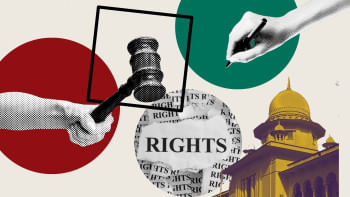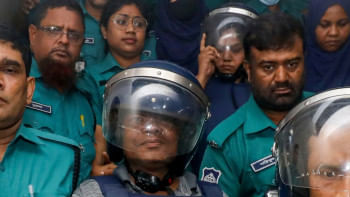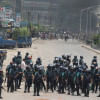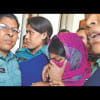Some concerns about the proposed changes in international crimes tribunals

While presenting a draft amendment to the International Crimes (Tribunals) Act, 1973—during a recent stakeholder discussion aimed at improving transparency in trial proceedings to prosecute crimes committed to suppress the mass uprising that toppled Sheikh Hasina's autocratic regime—a few concerns have arisen about the law's alignment with international standards, along with some laudable propositions.
The good news is that, at the invitation of the interim government, a fact-finding team from the United Nations Office of the High Commissioner for Human Rights has already launched an independent investigation into human rights violations that occurred between July 1 and August 15 this year during the student-led protests. Newspaper reports indicate that the team will investigate 15 categories of human rights violations, including crimes against humanity and extrajudicial killings, with the investigation report expected to be submitted to the interim government by the last week of November. The fact-finding team is mandated to establish facts, identify responsibilities, analyse root causes, and make concrete recommendations for Bangladesh to address past human rights violations and prevent their recurrence, according to a UN statement.
Meanwhile, the central health committee of the anti-discrimination student movement, in its latest estimate, reported that 1,583 individuals had been killed and over 22,000 injured during the July-August unrest. This information was shared by the chief adviser of the interim government in a post from his verified Facebook page on October 6.
Speaking at the brainstorming session on the amendment to the law, Law Adviser Prof Asif Nazrul made the government's intentions clear, saying, "We no longer want wounds or divisions in this society. Through these trials, we want to initiate a process of reconciliation. Everyone should agree that the trial conducted is fair and that the punishment, if given, is fully deserved."
However, the provision for death penalty in Bangladesh's justice system is a major roadblock to bringing the process in line with global standards, especially when democracies around the world are calling for complete abolition of capital punishment. At the end of 2023, as many as 112 countries were fully abolitionist and 144 in total abolished the death penalty in law or practice, according to Amnesty International. The proposed changes to the law in Bangladesh, regrettably, fall short of embracing the principle of abolishing the death sentence. And since the UN opposes the use of the death penalty, there is no scope for UN endorsement in this matter. Death penalty is irreversible, leaving no room for correction in the event of judicial errors, and it has proven ineffective as a deterrent to crime. Its most troubling aspect, however, is its frequent misuse to suppress dissent, whether political, religious or otherwise.
The judiciary has the critical responsibility of preventing miscarriage of justice and ensuring that no innocent person is wrongfully convicted or punished. As the saying goes, "It is better to let a hundred guilty persons go free than to convict one innocent person."
Another eyebrow-raising aspect of the proposed changes to the 1973 law is the call for the introduction of a provision that would allow banning political parties for up to 10 years if found guilty of crimes against humanity or genocide. If implemented, this provision risks treading a fine line between justice and the violation of fundamental rights. It is worth noting that no political party's charter or constitution endorses acts such as murder, violence, discrimination of any kind, or crimes against humanity, raising the question of whether a political party as an entity can truly be held criminally responsible. In practice, criminal charges are typically brought against individuals or leaders within the party, rather than the organisation as a whole.
Let's look at the existing laws that prohibit people from forming parties. Article 38 of the constitution states that no citizen shall have the right to form or be a member of an association if it is formed with the intent to destroy religious, social or communal harmony among citizens; to create discrimination among citizens on the grounds of religion, race, caste, sex, place of birth or language; to organise terrorist acts or militant activities against the state, its citizens, or any other country; or if its formation and objectives are inconsistent with the constitution. According to Section 18 (1) of the Anti-Terrorism Act, 2009, the government, based on reasonable grounds, may issue a gazette notification to include an individual in the schedule or declare an entity banned and list it in the schedule for being involved in terrorist activities. Therefore, the authorities' task is to prove that the entity to be banned is involved in terrorist activities. Is doing so as simple as it sounds?
Appointments of foreign lawyers in court proceedings, along with the recording and broadcast of trials via the internet or other mediums are commendable measures. Moreover, the decision to allow representatives from foreign governments, non-governmental organisations, and international organisations to attend public hearings, trials and other proceedings reflects a commitment to openness and accountability.
With Bangladesh embarking on broader reforms across all spheres of governance, these trials to prosecute those responsible for upholding and promoting a fascist regime of 15 years must meet international standards of transparency. Only through such rigorous legal processes and appropriate punishments can the country hope to eradicate the roots of autocracy and fascism altogether.
Shamim A. Zahedy is a journalist. He can be reached at [email protected].
Views expressed in this article are the author's own.
Follow The Daily Star Opinion on Facebook for the latest opinions, commentaries and analyses by experts and professionals. To contribute your article or letter to The Daily Star Opinion, see our guidelines for submission.

 For all latest news, follow The Daily Star's Google News channel.
For all latest news, follow The Daily Star's Google News channel. 












Comments